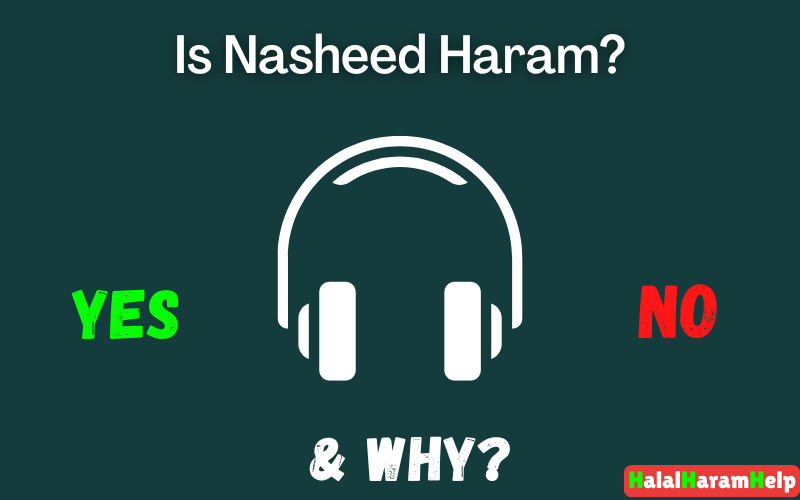Nasheeds are a popular form of Islamic devotional music, often sung to convey religious messages and foster spirituality.
However, there’s an ongoing debate about whether listening to or singing Nasheeds is permissible in Islam.
While some view Nasheeds as a way to deepen their faith, others question their permissibility due to the use of musical instruments or content that may not align with Islamic teachings.
In this post, we will explore what makes a Nasheed halal (permissible) or haram (forbidden) and how to distinguish between the two based on Islamic principles. Let’s dive deeper into this topic.

Is Nasheed Haram?
Nasheed is not inherently haram in Islam. It depends on the content, intent, and the instruments used.
While Nasheeds can be a beautiful and spiritual form of worship, they must adhere to certain guidelines to remain permissible according to Islamic principles.
In this article, we will explore when Nasheeds are considered halal (permissible) when they are deemed haram (forbidden), and the impact they can have on a Muslim’s faith and community.
You might also like to know is Tiktok halal.
When Is Nasheed Halal?
Nasheeds are generally considered halal when they adhere to the following criteria:
1. Absence of Musical Instruments (Except the Duff)
Islamic scholars have differing opinions on the permissibility of musical instruments, but most agree that traditional instruments, such as guitars, drums, or flutes, are haram because they can lead to distraction and sinful behavior.
However, the duff (a type of drum) is an exception and is permitted in certain contexts. If a Nasheed is sung without the use of musical instruments other than the duff, it is typically considered halal.
2. Religious And Inspirational Content
Nasheeds that contain religious content, such as verses from the Quran, Hadith, or poetic praise of Allah, are permissible.
These Nasheeds aim to inspire spiritual reflection and remind listeners of their faith. They should avoid secular or irrelevant themes, focusing solely on messages of devotion and religious knowledge.
3. Sincere Intent
The intention behind singing or listening to a Nasheed plays a crucial role in its permissibility.
If the purpose is to strengthen one’s connection to Allah, gain religious knowledge, or uplift the spirit, the Nasheed is more likely to be halal.
However, if the Nasheed is intended merely for entertainment or to evoke emotional responses like secular music, it may not align with Islamic principles.
4. No Harmful Or Inappropriate Messages
Nasheeds should avoid vulgar or inappropriate language, as well as content that contradicts Islamic values.
Themes like romantic love or materialism, which are common in popular music, are discouraged in Nasheeds. A Nasheed that promotes religious values, moral teachings, and piety is more likely to be permissible.
Also see is it haram to eat with left hand.
When Is Nasheed Haram?
Nasheeds become haram when they fail to meet the above criteria. Here are some situations in which a Nasheed would be considered forbidden in Islam:
1. Use Of Prohibited Instruments
Any Nasheed that uses musical instruments, other than the duff, falls into the category of haram.
This includes modern instruments like guitars, drums, and synthesizers, as well as electronic beats.
Many modern Nasheed artists use such instruments, which can render the Nasheed impermissible according to traditional Islamic teachings.
2. Content That Does Not Align With Islamic Teachings
Nasheeds that contain irrelevant or secular themes, such as love songs, party anthems, or songs with inappropriate language should be avoided.
These types of Nasheeds do not serve the purpose of reminding believers about their faith and can divert them from religious obligations.
3. Entertainment-Focused Intent
If the intention behind the Nasheed is to entertain or amuse listeners, rather than to promote religious knowledge or spiritual growth, it may be considered haram.
Nasheeds should not be used simply as a form of entertainment, as their purpose is to remind Muslims of their faith and encourage devotion to Allah.
4. Women Singing In Front Of Non-Mahram Men
For female singers, it is prohibited in Islam to sing in front of non-mahram men (men who are not closely related).
This is a sensitive issue, and if a Nasheed involves women singing for an audience of men, it may be considered haram due to the potential for attraction or inappropriate interaction.
5. Nasheed That Promotes Sinful Behavior
Any Nasheed that encourages sinful behavior or distracts from religious duties should be avoided. This includes Nasheeds that glorify haram activities or lead listeners away from their moral obligations as Muslims.
The Benefits Of Listening To Halal Nasheeds
When Nasheeds are halal, they offer several spiritual benefits:
Strengthening Faith: Listening to Nasheeds that include Quranic verses or Hadith can help reinforce your understanding of Islam and increase your connection to Allah.
Spiritual Upliftment: Nasheeds can invoke feelings of devotion and mindfulness, reminding listeners of the greatness of Allah and encouraging them to practice their faith more deeply.
Support in Difficult Times: Nasheeds can provide comfort and peace of mind during challenging moments, as they often contain words of encouragement and inspiration from Islamic teachings.
Alternative to Haram Music: For those seeking to replace secular or haram music with something more spiritually fulfilling, Nasheeds provides a wholesome alternative that keeps the listener grounded in faith.
You can also see is it haram to have a dog in the house.
Conclusion
In conclusion, Nasheeds are not inherently haram, but their permissibility depends on the content, intention, and instruments used.
When they promote Islamic teachings, avoid secular themes, and use only permissible instruments like the duff, Nasheeds can be a spiritual and uplifting experience.
However, if they are focused on entertainment or contain inappropriate content, they may be considered haram.
By choosing Nasheeds that align with Islamic values, Muslims can enjoy the benefits of this form of worship while staying true to their faith.


